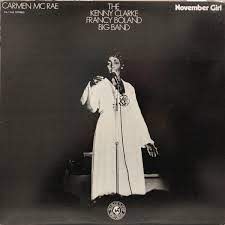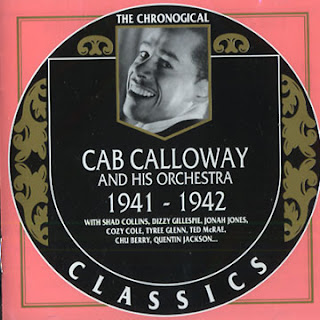Carmen McRae and the Kenny Clarke-Francy Boland Big Band - November Girl
Carmen McRae (1920-1994) is one of the great jazz vocalists and has had a long career steadily releasing albums from the mid-1950s through the early 1990s. This collaboration with the Kenny Clarke-Francy Boland big band was recorded in 1970 and released in 1975 by Black Lion. The strength of this European-based band featuring a number of expatriate American jazz musicians lends a lot of weight to the arrangements and the swing material especially sounds strong. Sometimes, the presence of Boland's effects-treated Wurlitzer or organ gets in the way, but overall it's an excellent record and both the band and McRae sound strong. But she is the focus here and except for a few solos the band is mostly relegated to a supporting role.
Bebop legend Kenny Clarke and Belgian pianist, arranger, and composer Francy Boland first played in 1959 (with charter member Jimmy Woode on bass) and released the first Clarke-Boland big band record in 1961. Based in Cologne, Germany the band lasted through 1973 and featured a number of American expatriate jazz musicians and November Girl features Benny Bailey, Idrees Sulieman, and Art Farmer on trumpets, Sahib Shihab and Billy Mitchell on saxes, and Jimmy Woode on bass. I'm sadly uniformed of European jazz musicians, but there are the English saxophonists Ronnie Scott, as in the name of the famed London jazz club, and Tony Coe, who was offered to join Count Basie in 1965, an offer he did not accept.
"A Handful of Soul" was written by Serbian trumpeter Dusko Gojkovic. Born in Yugoslavia, he moved to Germany in 1955. After spending time in the states during the 1960's, studying at Berklee f and playing in the big bands of Maynard Ferguson and Woody Herman, he returned to Germany where he has maintained his career. The tune is a waltz and is nice, but I don't care for the lyrics which are really dated. Otherwise a highlight is the short solo on flute by Sahib Shihab, including some breaks featuring his flutter tongue technique.
An early and enduring influence for McRae was Billie Holiday whom she met in 1937. By the time of November Girl from 1970, McRae's approach and sound was fully developed and matured and she sounded like no one but herself, but conceptually it's all from Holiday. She has a very distinctive sound and approach to singing, utilizing the whole range of her voice in one song (as often does here), varying the timbre on her voice, and sounding comfortable on just about any material. She scats well but only occasionally as she prefers to reinterpret the melody and the song she sings. I believe too she follows the meaning of the words and besides improvising the notes, rhythms, phrases, etc, she toys with the pronunciation of the words and its syllables. On the other end of the spectrum, sometimes she'll stick close to the melody and rely on her voice and phrasing to carry the performance. A typical performance by McRae features the above extremities and everything in between as on November Girl.
 |
| Kenny Clarke |
Dizzy Gillespie makes a cameo appearance playing snare drum (!) on one track, the shuffle-bossa "Just Give Me Time".
The material is mostly original, at least according to the credits. The line "All Arrangements by Francy Boland" implies to me that the names next to the song titles are the composers, but "'Tis Autumn" and "You're Getting To Be A Habit With Me" are standards and credited to 'Feldman' who I don't believe is the composer. The rest of the songs are more obscure so I assume they are properly credited and interestingly enough most of them are written or co-written by bassist Jimmy Woode.
Woode (1926/1927-2005) is best known for being Duke Ellington's bassist from 1955 to 1960. He had worked previously with Flip Phillips, Toots Thielmans, Sarah Vaughan, Ella Fitzgerald, and Billie Holiday. After leaving Ellington, Woode moved to Sweden in 1960. He was in fact following in the footsteps of his father, also Jimmy Woode, a jazz pianist who went to Sweden with "Hot Lips" Page in 1947 and stayed for the rest of his life, remaining active until the 1990s. The younger Woode also lived in Switzerland, Austria, and France, but moved back to the States in 2001. In the 1960s and 1970s he was an active part of expatriate jazz scene in European playing with Bud Powell, Johnny Griffin, and Don Byas. He told an interviewer late in life that he never had a birth certificate and it is uncertain whether he was born in 1926 or 1927.
 |
| Jimmy Woode |
I never knew he was a composer and they are wonderful tunes. "November Girl" co-written with Boland is a wonderful ballad that deserves to be better known. There are nice chromatic chords in the bridge and some tricky jumps which McRae handles with ease. Her performance is excellent and Boland's arrangement is tasty without ever getting in the way. Tony Coe gets the bridge on tenor but it's too short.
"Just Give Me Time", also co-written by Boland and Woode sounds somewhat dated because of the groove, the chords, and that strange keyboard sound. I think if it were more definitely a Wurlitzer or a B3 with a fatter tone then it would be ok, but Boland doesn't know his effects and it just sounds out of place.
Woods's "Dear Death" is better with a James Bond introduction with lusty plunger muted trumpets. It's a minor themed piece with a wonderful mysterious sound. Sometimes it sounds like a 1960s version of Ellington's "jungle" sound with low unison saxophone riffs and muted trumpets. Here, Boland's lurking keyboard sounds appropriate and adds to the arrangement.
"I Don't Want Nothin' From Nobody" was co-written by Woode and Kenny Clarke and this tune is more straight-ahead . It's actually based on the chord changes to Sonny Rollins' "Doxy" which itself was based on a rhythm and blues song for which I have no recollection of the name. Anyway, it's chord progression is suitable for swing and blues and that's exactly what this chart is about. On this McRae really shows off her range singing down to her rich low register. The upper register has a bit of a growl or grit to it and it's a wonderful contrast. She ad libs on the words at the end and even scats a little. The full ensemble part is a highlight of the band but is unfortunately ruined by the electric keyboard which is just in the way. It ruins a great chart and performance.
 |
| Dusko Gojkovic and Dizzy Gillespie |
The standard "You're Getting To Be A Habit With Me" is another a swing number building to a rousing finish and features a fine tenor solo from Billy Mitchell. "'Tis Autumn" is a ballad that McRae sings from beginning to end, maintaining a fine presence while Boland's arrangement enlivens the chart but again does not get in the way. The album ends with Woods's "My Kinda World" and is again more in the Swing vein enlivened with bluesy lines.
In the liner notes, she is described as a "jazz-oriented" singer which is a rather interesting conclusion. She's definitely not a popular singer, but I guess she wasn't jazz enough for the writer. Perhaps it's because over her long career, McRae can be heard in a number of different settings and projects herself in various guises: popular singer, supper club singer, jazz singer, etc. For me, this range of experience allows her a variety of expressions available to the jazz vocalist. Is Christian McBride jazz-oriented bass player because he recorded some things on electric, including funk, rock, and soul covers? Of course not. But jazz vocalists carry a different stigma this issue plagues jazz vocals and vocalists even today.





Comments
Post a Comment